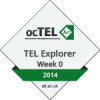-
c.collis wrote a new post, #ocTEL wek four, TEL One: e-assessment, on the site ocTEL 2014 10 years, 7 months ago
-
c.collis wrote a new post, #ocTEL Explorer activity 3.5: evaluating a resource in your area, on the site ocTEL 2014 10 years, 7 months ago
-
c.collis replied to the topic in the forum 10 years, 8 months ago
I watched Khan Academy’s Microeconomics lesson on the Nash Principle (or was it equation), and I played the e-learning game Record Tripping.
Khan Academy:
This was aimed at a reasonably educated student; it was neither very basic nor advanced. I’ve done some research lately on whether Australian students prefer hearing an Australian to an…[Read more]
-
c.collis replied to the topic in the forum 10 years, 8 months ago
Hello Hannah. Thanks for sharing this great activity idea. I’ve left feedback on your blog.
-
c.collis replied to the topic in the forum 10 years, 8 months ago
Hi James. I agree with the others here that your learning while/by doing approach is an excellent one. This is the reason I’m doing ocTEL myself: I’m building lots of content knowledge, but I’m also having the experience of being an online student, and from that, learning what is effective and what isn’t from a user point of view.
Like Moira,…[Read more]
-
c.collis wrote a new post, ocTEL Activity 2.4(b): design an authentic learning activity, on the site ocTEL 2014 10 years, 8 months ago
This activity involves designing an online, authentic learning activity. It was only after I designed the activity that I re-read the instructions and saw that it was meant to be a “short” activity; this one is designed to last for a full year. Nonetheless…
Activity title: “Producing: Practice”
Cohort & rationale: The activity is designed for a final-year university Bachelor’s degree unit in which approximately 10 teams of up to 5 students undertake industry-based projects for a full year. Each team is attached to an individual industry partner with whom it works for the year. The projects are different from internships in that students are working in teams, and they are working semi-autonomously on projects given to them by the industry partner. In this sense, the student project teams work more like consultants or subcontractors than interns. Students are from the Entertainment Industries course, which educates students for intellectual careers in the entertainment sector, working as entertainment Producers. This activity is specifically designed to address a problem in the unit. At present, each team goes off and has its own learning experience, but there is very little peer-to-peer learning and support between groups. There is no peer learning from cohort to cohort, particularly because this is a final-year unit and students graduate immediately upon completing it. Although many of the teams are dealing with similar issues, each team’s learning remains fairly discrete.
The activity: Build/update the “Producing: Practice” wiki
Following the “contributing student approach” (Collis & Moonen 2001), and grounded in Kolb’s experiential learning model, this activity involves students sharing and researching their industry project experiences, and then creating (in subsequent years, updating) a wiki of support resources addressing key issues which arise in those experiences.
Weeks 1-2 Equipping: in these weeks, students watch a video of the unit coordinator explaining the assignment. Students are then given links to the various technologies they may use in their assignment work over the year, as well as links about how best to use those technologies. Students will complete one of the “are you ready for online learning” questionnaires (see ocTEL activities week1) to identify areas in which they require development. Students will be required to pass a short online quiz about the technologies before they can continue in the unit.
Weeks 3-10 each student keeps a blog about her/his project experiences. The blog will be visible to other students, but not to the wider public: it will be hosted on the university’s VLE, Blackboard. For reasons of commercial confidence (most student project teams are asked to sign non-disclosure agreements by their industry partners), the blogs will focus more on generic issues such as time management, communication, research, and management styles. To ensure inclusion, blogs can be in written or video format.
Weeks 11-13 As a cohort, the students will be required to define up to six key issues identified by the blogs. How the students do this will be up to them, although there will be a video from the unit coordinator suggesting ways in which group discussion and decisions can be handled. This will cause students some discomfort; as Panos Vlachopoulos observed this week, shifting learning responsibility over to students can cause discomfort for both students and the instructor. Ideally, this task will empower students to take ownership of the project and to begin to self-direct their learning.
Weeks 14-18 each student will contribute to building a wiki: the wiki will become a resource for Project students. The wiki will provide support and information about dealing with issues students face while doing industry Projects. Each student will select one area of the wiki on which to focus. Each student will be required to make “substantial contributions” to the wiki in the form of links to research papers, links to how-to videos and guides, recordings of interviews with students in the unit, and any other relevant online material.
Weeks 19-20. Students edit others’ wiki entries where useful.
Assessment:30% blog
20% productive professional behaviour
50% contributions to wiki, including editingIntended learning outcomes:
Students who complete this unit successfully should have developed:advanced research- and peer-informed professional practice
an understanding and identification of many of the key professional issues faced by Project students, and strategies for addressing these issues
a network of peers for learning and professional development
the ability to communicate in a variety of modesIn terms of the “development of skills and literacies needed in professional practice, and which reflect{ } the nature of the discipline” aspect of this ocTEL assignment, the project is reasonably generic in itself: this type of project could be used in any industry placement/project context. However, the resource produced will be highly profession-specific, giving students a sense of the industry-specific aspects of their future profession. How does communication work in the industry? How does time management work? This learning will complement more generic “prepare for your professional future” resources available. The activity builds students’ capacity for professional reflection, and research-informed practice. It scaffolds their becoming networked peer learners, an attribute which will be highly valuable post-graduation. The wiki becomes a reusable learning object that can be updated and drawn upon by subsequent cohorts.
Technical issues: Some resourcing will be required to set up the initial template for the wiki: the first cohort of students to undertake the project should not have to design the front end of the wiki. Some moderation may be necessary to ensure client confidentiality is not breeched, and to facilitate discussion. Weekly ‘prompts’ may be emailed to students to suggest questions they might address in their blog posts. Pre-unit preparation will involve filming and editing the online video lectures, building the page of possible technologies and technology support links, and including links to the online learning self-assessment material.
Drawback: Ideally, the peer-to-peer learning would take place in closer to real time. With this activity, the wiki is not complete until the end of the semester, when students are completing their projects. I need to consider how I could build a reflecting-in-action (Shon 1983) element into the unit. Ideas, ocTEL?

-
c.collis replied to the topic in the forum 10 years, 8 months ago
As another non-gamer, I’ve just played the requisite two games: westward and lost in the city. Neither, I’m afraid to say, grabbed me: I played each one for 15 minutes, and didn’t feel adequately engaged enough with either to continue.
Westward: clunky interface, felt like something from the 80s. I didn’t feel as if I was doing anything…[Read more]
-
c.collis replied to the topic in the forum 10 years, 8 months ago
Hello Karen. Good post. As I’ve noted in my blog post on this topic, I think being a strategic ocTEL learner is a good thing: It’s crucial to have a focus for our learning here, and to use ocTEL to work strategically towards it, or else the content is just too overwhelming and incoherent. Certainly there’s deep learning going on along the way as…[Read more]
-
c.collis replied to the topic in the forum 10 years, 8 months ago
Thanks everyone for rich and thoughtful dialogue. Diana, I appreciate your anatomising the roots of the “deep/strategic” distinction: I’ve added Entwistle’s and your pieces into my (growing!) ocTEL “to read” list. Gary, I often find designing and assessing what are conventionally seen as ‘deep’ activites easier than ‘strategic’ ones: to design a…[Read more]
-
c.collis replied to the topic in the forum 10 years, 8 months ago
This sounds like a good way of scaffolding deep learning online: thanks for the useful example. I’m interested to hear whether or not this activity generated much peer interaction and peer learning: was there much activity in the group discussion board, or on other social media outside the VLE? Did the videoconferenced presentations elecit much…[Read more]
-
c.collis started the topic in the forum 10 years, 8 months ago
See blog post at http://chcoll.wordpress.com/ Week 2 Approaches to Learning activity. Comments welcome.
-
c.collis wrote a new post, #ocTEL activity week 2 : approaches to learning, on the site ocTEL 2014 10 years, 8 months ago
-
c.collis wrote a new post, #ocTEL week one webinar notes, and badges, on the site ocTEL 2014 10 years, 8 months ago
Badges!
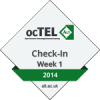
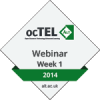
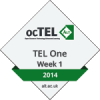
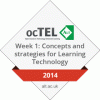
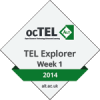
Here are some notes from the week one ocTEL webinar:
Kyriaki Anagnostopoulou, University of Bath
-it’s difficult to evaluate learning technologies that are embedded in contexts: how to evaluate them separately from the context?
-learning design as a choreography to the ‘dance’ of learning. At first I thought this seemed prescriptive–”left foot here, right foot here”–until I thought, it depends what kind of dance you’re talking about. First-year choreography is necessarily prescriptive–a waltz–while final-year choreography may be more interpretive dance.
-Ron Oliver’s “tasks, resources, support” model (1999) (Hi Ron!)
-focus on authentic learning: public outputs result in higher quality of student work
-Verpoorten’s 8 learning events model
-Bath Digital Literacies online student self-assessment: student completes self assessment, and is then recommended student and faculty-specific resources to address any challenge areas identified
-technology needs to enhance and add to the learning experience, not to be a clumsy bolt-on
James Little, University of Leeds
-academics feel: “not enought time to catch up!” No real solution offered other than that they should be involved in multiple networks of communicaiton about T&L practice. This doesn’t seem to address the issue, however.
-don’t’ assume the same level of technological ability across the student cohort
-students just want technology to work, not to be an “additional barrier”
-digital resident/visitor rather than native/immigrant concept
-SAMR model: modification and redefinition using technology are transformative; substitution and augmentation using technology are enhancement

-
c.collis wrote a new post, #ocTEL activity 1.3: Champions and critics of teaching machines, on the site ocTEL 2014 10 years, 8 months ago
-
c.collis earned a week 0 badge: TEL Explorer Badge 10 years, 8 months ago
-
c.collis posted a new activity comment 10 years, 8 months ago
In reply to: Grant posted an update in the group Paul is looking for participants: Activity 0.2: Small group reflection As others have said, it seems clear that there is a great range of experiences and preferences among the […] ViewI agree that it may well be a cultural solution that’s needed, rather than a technological or a pedagogical one. It’ll be interesting to see if I can effect a cultural shift by having a Learning Designer attend our monthly departmental meetings: my hope is that this will integrate him/her into the departmental culture, and will shift academics’…[Read more]
-
c.collis's profile was updated 10 years, 8 months ago
-
c.collis wrote a new post, #ocTEL activity 1.1: my practice, on the site ocTEL 2014 10 years, 8 months ago
In the final-year project unit I coordinate (see for details of the large group project), the 160 students write a final reflective analysis essay which is worth 60% of their unit mark. The essay requires […] -
c.collis posted a new activity comment 10 years, 8 months ago
In reply to: Grant posted an update in the group Paul is looking for participants: Activity 0.2: Small group reflection As others have said, it seems clear that there is a great range of experiences and preferences among the […] ViewAs a result of thinking that through, I’ve come up with one new initiative: I’m going to invite one of the Learning Designers to attend each of my department’s monthly departmental meetings. The LD will have a standing agenda item each month: s/he will either give an update about a piece of tech that is working particularly well in our areas at…[Read more]
-
c.collis posted a new activity comment 10 years, 8 months ago
In reply to: Grant posted an update in the group Paul is looking for participants: Activity 0.2: Small group reflection As others have said, it seems clear that there is a great range of experiences and preferences among the […] ViewHi Grant: I’m also particularly looking forward to hearing and learning from teachers about their TEL experiences. I’m benefiting from the participation of many ‘technologists’ here because this is their world and they have a wealth of resources and references to share. In practice, I find that sometimes technologists and teachers work at cross…[Read more]
- Load More

